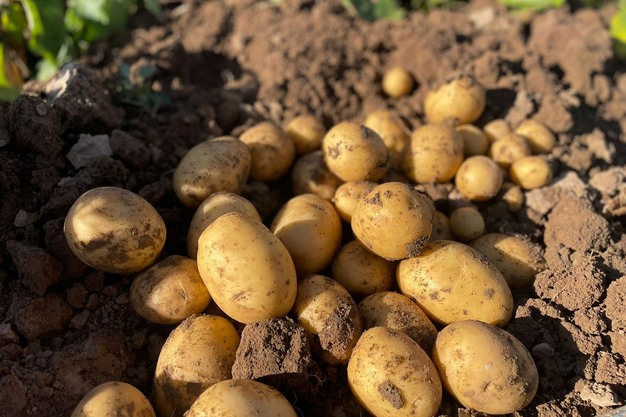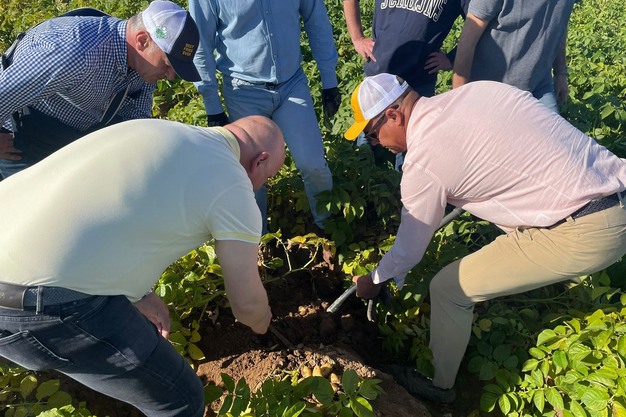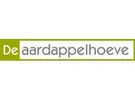This week marks the arrival of the first shipments of Spanish potatoes at De Aardappelhoeve. Bart Nemegheer had already visited his Spanish growers last week, but now the company can truly kick off with the Spanish selection. "It's just in time, as all of Europe is looking towards Spain for their supply. This results in strong demand and favorable pricing," explains the seasoned trader from Tielt.

He is also satisfied with the quality of the volumes coming from Spain. "It looks quite good. In the Sevilla region, there has been a significant amount of rain. After months of drought, they received 200 mm of rain in a week in April, leading to some disease pressure, especially among the organic varieties. As a result, the sizes are somewhat smaller, but there is a considerable volume readily available. This is also necessary, as everyone is keen to switch to Spanish potatoes."
According to Bart, several factors contribute to this situation. "Firstly, there's a shift away from using potatoes from Israel. Additionally, the germination of the old Belgian crop is challenging. It was, of course, a very difficult harvest season, with potatoes having to be harvested under very challenging conditions. Many fields were too wet at harvest, leading to quality issues. It's not bad, but there's a lot of disease pressure. Finally, supermarkets are increasingly lowering the MRLs for sprout inhibitors. There's a legal MRL, but many retailers want to go below that for themselves, leading to germination issues. These are the reasons why many quickly choose to switch to new potatoes, eagerly awaiting the Spanish offer."
Organic on the rise
This applies to both conventional and organic potatoes, which represent a relatively significant share of De Aardappelhoeve's offering. "However, we also noticed that in other years we still had supply from Israel, but we didn't work with them this year, meaning we had to import everything from Spain. In October, we already realized that the situation didn't look good, which is why we immediately started discussions with our Spanish growers about the possibility of expanding the organic acreage. This shift ensured our supply for the upcoming season. The volumes are set, so we don't have to worry about deliveries."

And it's a good thing, too, as the organic segment is on an upward trend after a challenging period. "With the pandemic, we really saw a peak. People were very focused on health, and since no one could dine out, there was more budget available, leading to an increase in organic sales. However, after the pandemic, we experienced a significant drop. This was also due to the situation in Ukraine. These were uncertain times, with everyone being more cautious with their budget. Yet, in the last quarter of last year, an upward trend was visible again. The war had been going on for a few years by then, and everyone saw that it had relatively little impact on our lives, which restored confidence. Moreover, there was a wage indexation in Belgium, which meant people's salaries increased by 10 percent. The purchasing power is there, so those who are open to it can invest in organic. It's going well now and there's a healthy market."
Step towards the UK
Therefore, De Aardappelhoeve decided to take its first steps into the export market with its convenience brand The Potato Chef. Previously active mainly in Belgium, a collaboration with a British chain for The Potato Chef products will start at the end of the year. "We'll be on the shelves in the United Kingdom from September with, initially, a basic assortment," explains Bart. "I think there's a lot of potential for us in the UK. In British supermarkets, you either have ultra-fresh or frozen. The issue with ultra-fresh is that it's only shelf-stable for 2 to 3 days. This leads to a lot of food waste. Imagine how difficult it is to purchase exactly the right amount, which has to be sold almost immediately. It's almost always too much or too little, but no one wants too little. So, it gets thrown away if not sold."

"With The Potato Chef, working with blanched or pasteurized potato products, we can preserve freshness but also extend shelf life. This makes it very interesting for both the supermarket and the consumer. Hence, we were able to start this collaboration, seeing many possibilities for expansion in the future. It's always hardest to get your first customer. But once you have one, people can see, taste, and compare. Then it can take on a life of its own, allowing you to grow steadily. At least, that's my experience in my 20 years in the business," Bart laughs.
For now, the focus remains on the UK. "It's important for us to establish ourselves there properly. A lot comes with it, including documentation and logistics. Moreover, it's a huge market with endless consumers. You need to be able to serve them well and reliably. You don't want to overextend yourself, but we want to grow step by step, after which we'll certainly look at what might be possible in other countries in Europe."
For more information:
Bart Nemegheer
De Aardappelhoeve
Putterijstraat 7A
8700 Tielt (België)
+32 (0)477 29 17 84
[email protected]
www.deaardappelhoeve.be
